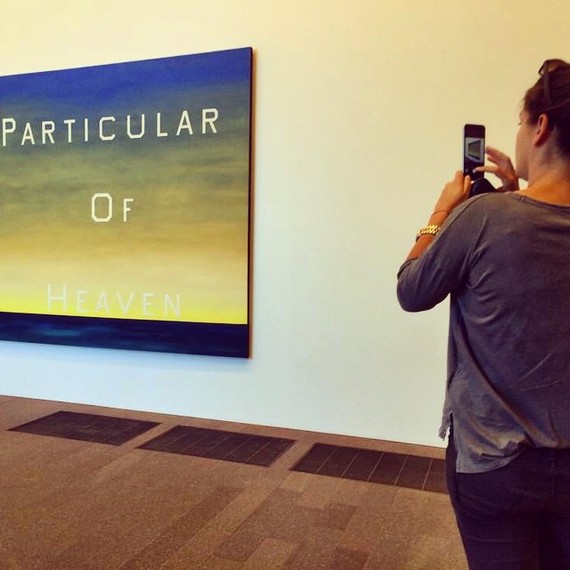
So, some museums are now banning selfie sticks? Fascinating.
Five months ago, I stood in a modern art exhibition at the de Young Museum in San Francisco and was captivated by the unplanned, non-curated selfie exhibition taking place in front of me. It was live in front of a Roy Lichtenstein piece: Painting with Statue of Liberty. Person after person snapped selfies, with seemingly little interest in the art itself.
I wanted so much to photograph these people who were photographing themselves, but that seemed intrusive. So, my friend and I sat on a bench for 15 minutes and observed. Person after person snapped away, then almost all moved on fairly quickly. They seemed happy only for a moment -- when they turned the camera on themselves and smiled big for their audience, then they moved on with more serious faces to the next selfie opportunity. It was an unsettling experience in some ways, and perhaps an unintended commentary on our times.
What struck me as sad about the experience was that almost all of the people capturing selfies in front of the artwork spent so little time with the art. They captured their image and moved on, seeming to value their own proof of experience more than the experience. They seemed to be more interested in showing where they were than in being where they were.
And that made me pause and think. Is this what our modern experience is?
A catalogue of moments displayed to the world. I was here. And here. And here.
Do we experience anymore, or merely document?
Stand in the back of any public event and observe the sea of phones and the slew of photographs being taken (some selfies and some not) but all social proof of an experience. We seem to have become a world of people documenting, not living.
Still, if this is true, is that any different than in the past? I'm fairly certain that when photography and film started growing in popularity, there was an anti-wave that sprung up -- "Oh no, you're not enjoying anything. You're just recording it now." Or, like almost everything in our present-day society, is there now just more of it, and so the ubiquity presents as proof of something unproven?
On that day in the de Young, I kept my phone in my pocket for almost the entire time, as I do in most museums. Sometimes, I just like to get lost in my head and not the world, and museums are wonderful places for doing that. I did take my phone out to snap a photo of my friend photographing a piece of art, and to capture the name of an exhibition that I thought another friend would like. But I had no need to tell the world what I was seeing (although I do so here right now), but only to experience and appreciate what I was seeing. And so I now wonder if this is what we're losing -- this value of experience -- or whether we're losing anything at all.
Some would argue that it's wonderful that people still go to museums, and that selfies are harmless. I can see the merit in that reasoning. Yet some part of me wants to tell people to stuff their phones in their pockets and stand in front of an incredible piece of art and just be. Breathe and feel what the art brings forth in you. All of the emotions are not comfortable, but they're important to feel. Or at least I think so.
And I think that if you do it right, the moment is enough. Nay, it's more than enough. The moment trumps the selfie.
